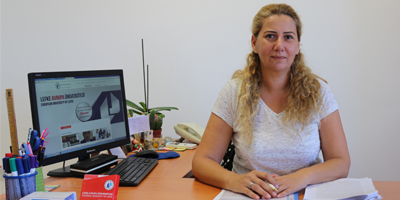Okray, Head of EUL Department of Psychology, shared information on the Covid-19 Pandemic and Changing Mental Health Criteria

Head of the Department of Psychology, European University of Lefke (EUL) Faculty of Arts and Sciences Assoc. Prof. Dr. Zihniye Okray provided information on the Covid-19 Pandemic and the Changing Mental Health Criteria.
“COVID-19 coronavirus is a virus with a high droplet transmission rate that causes severe acute respiratory syndrome and can lead to rapid death, especially in people with chronic diseases. Saying that the death rate from person-to-person transmission has been reported as 2-5% by many researchers, Okray said that in March 2020, strict measures were taken in approximately 136 countries to limit the spread of COVID-19, including the prohibition of staying at home, 2 meters of physical distance and social gatherings, she expressed. Stating that large masses of people accompany this, Okray said that regular hand washing, hygiene and health campaigns suggesting the use of personal protective equipment (PPE) such as face masks and gloves were organized.
“Fear of insecurity and uncertainty caused by COVID-19, separation and the loss of certain important relationships and major changes in lifestyle have strongly evoked emotional responses in the general population that can cause psychological problems,” said Okray. She stated that her constant worry is an important risk factor for mental health.
Stating that excessive anxiety is one of the most important etiological factors accepted in the development of obsessive-compulsive disorder (obsessive-compulsive disorder), Okray said, “The Disease Control and Prevention Centers use protective equipment such as social distance, masks and gloves all over the world, as well as keeping their hands at least 20 seconds. He emphasized that washing and disinfecting surfaces on a daily basis is important to prevent Covid-19 contamination. “These recommendations are written for healthy individuals and it is clear how challenging it can be for individuals with obsessive-compulsive disorder to follow these recommendations.”
“Researchers predicted about obsessive compulsive disorder (OCD) diagnoses that OCD diagnoses will increase in the next few months and even years. However, they tried to clarify a few issues that need attention at this point. The first of these is the need to ask whether individuals who are considered to be at risk of developing OCD will develop OCD again if they do not encounter such an epidemic, and whether the recommendation of washing hands frequently, emphasized by health authorities, will be considered as a symptom of disease from now on. On the other hand, they say that disease transmission and contagion obsessions have also increased the possibility of developing as new types of obsessions for individuals diagnosed with OCD. He stated that it will cause serious problems in OCD patients and make psychotherapy ineffective.
Lastly, Okray said, “In the treatment of obsessive compulsive disorder, the limitations imposed on washing hands and cleaning surfaces compulsions for individuals with contamination obsessions and cleaning / washing compulsions have brought to the fore the necessity of questioning how feasible they are due to the Covid-19 outbreak. The researchers emphasized that the Covid-19 epidemic can be turned into an advantageous discourse for OCD cases and that cleaning is an important factor in preventing diseases, and that this epidemic can also save them from the stigma imposed on OCD patients.
